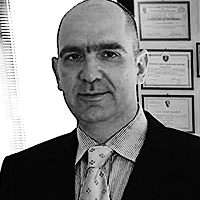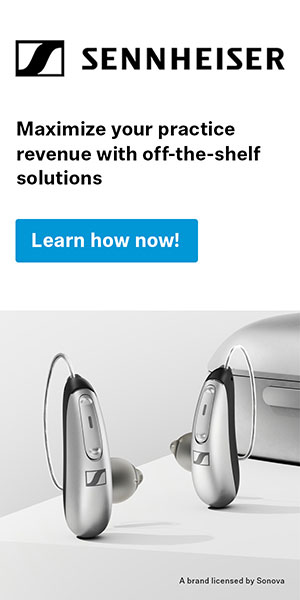Salus University Summer Workshops: Bridging the Distance Learning Gap
AudiologyOnline: Welcome Dr. Panagiotopoulos, please tell me a little about yourself.

Dr. George Panagiotopoulos: I received my Medical Degree in 1994 and completed my specialization in Otorhinolaryngology in 2003. Ever since then, I have been working as an ENT consultant. For the past seven years, I have been serving as head of the Audiology Neuro-Otology Department in 401 General Military Hospital of Athens, Greece. As an ENT consultant, I regularly treat patients with balance and hearing problems on daily basis. During this time, I completed my PhD thesis in Medicine in 2006 and an MSc in stress management and health promotion in 2014 with a dissertation regarding the coping mechanisms of patients with Tinnitus Distress. At this point, I realized that I needed to deepen my perception and professional knowledge in Audiology because I was managing patients daily with more complex hearing and balance complaints. This led to my completion of the Advanced Studies in Vestibular Sciences and Disorders program from Salus University in 2015, followed by the Salus Doctor of Audiology Bridge Program in 2017.
AudiologyOnline: What is the purpose of the four-day hands-on workshops at Salus University?
Dr. George Panagiotopoulos: Basically, the whole concept is about implementing evidence-based theory into hardcore practice. These workshops not only provide you with hands-on training but also, under the supervision of the faculty members, help you vastly improve your clinical skills. Regardless of your past level of experience, you are meticulously guided throughout the necessary procedures, step by step, in order to avoid pitfalls and obtain reliable and reproducible results.
AudiologyOnline: Which workshops did you attend and why did you select them?
Dr. George Panagiotopoulos: I’ll begin with the ‘Advanced Update on Hearing Aid Technology and Clinical Best Practices for 2017’ workshop, which was by far the least related to my previous background as a Physician. This workshop offered me a unique opportunity to acquire new knowledge and comprehend the prospects and limitations of modern hearing aid technology. With regards to my own patients, past and potential hearing aid users, this workshop greatly enhanced my empathy toward their concerns and difficulties. It helped me nurture their own expectations, depending on their audiologic evaluation, while I was collaborating with a hearing aid professional on providing them with the best possible outcome.
The ‘Auditory Processing Disorders: Science to Practice’ workshop represented a unique opportunity for me to wrap all my prior knowledge up together and understand the fundamental principles behind diagnosing and managing a patient suspected of APD. Far beyond the pure tone audiogram and the ABR, I understood how simple it was to obtain reliable middle and late latency recordings, when applicable, and to make me comfortable with the utilization and evaluation of the most widely used cognitive loaded verbal tests, such as speech in noise and dichotic tests. I’ll always remember how much I was impressed when I experienced the benefits of an FM system inside the classroom environment even though I consider myself a normal hearing person.
The last course I would like to mention is the ‘Hearing Conservation in Industry and Music: Practical Information for Practicing Audiologists’. During this course, I had the opportunity to understand the rationale behind appropriate noise dosage measuring and adequate protection. I routinely deal with patients with similar underlying pathophysiology due to gunshot exposure. Through this workshop, I incorporated new ways to measure ‘real ear’ noise exposure and expand my arsenal of hearing tests. This helped me intervene more rapidly not only with regards to early identification and proper management but also adequate prevention in terms of proper hearing protection prior to the exposure.
AudiologyOnline: Can you describe what an average day at one of the workshops looks like?
Dr. George Panagiotopoulos: First of all, you get a well-organized update on advanced and current science in the specific topic the workshop is about. You have the unique opportunity to clarify any query you may have and then during the hands-on training section, the background theory evolves into practice. This type of transformative learning involves experiencing a deep, structural shift in the basic premises of imparting knowledge where you have the opportunity to directly interact with the faculty experts. Simply by sharing their own experience, the faculty help you advance during the practical session demystifying any misconceptions you may have previously had.
AudiologyOnline: What was your favorite part of the workshops?
Dr. George Panagiotopoulos: It was all about constructive interaction. Just imagine, students from all over the world, with different cultural and scientific backgrounds, all sharing their experience and their knowledge under the supervision of world-class experts. Critical multiculturalism leading to multicultural education by integrating and advancing evidence-based theory into the scope of praxis. That was simply amazing to me.
AudiologyOnline: Did the offering of these hands-on workshops influence your decision to attend Salus for your Doctor of Audiology degree?
Dr. George Panagiotopoulos: I had the benefit, prior to my AuD degree, to attend the Advanced Studies in Vestibular Sciences and Disorders program. At first, I was very enthusiastic about the idea of distance learning without having to close my private practice office. The quality of education I received, along with the way in which all my questions were thoroughly administered through the asynchronous platform, vastly surpassed my expectations. It was then very straightforward for me to keep on attending Salus for my Doctor of Audiology degree. Furthermore, the hands-on workshops offered me the opportunity to meet my teachers in person and interact with them directly.
AudiologyOnline: What was the assimilation like from participating in the online Salus courses to attending workshops on Salus’ campus?
Dr. George Panagiotopoulos: First of all, regarding workshops on Salus’ campus, the interaction between the faculty and the students was direct and imminent. There were no time differences as there are on the online platform, so the conversation was taking place right there during the workshop. I was particularly impressed by the fact that although there were instances where the background theory of a particular on-campus course may have been partially covered by a similar online course a few months before, there were always available evidence-based updates that were presented to us either by reinforcing or attenuating a theory or a thesis that we’d been taught during our online courses a few months before.
AudiologyOnline: How did the clinically-based workshops complement the material you learned in your twenty-eight didactic courses?
Dr. George Panagiotopoulos: It would be suboptimal to teach too much of the theory of diagnosis and management in Audiology without concurrent practical experiences that will help elucidate these theories for students.
I strongly believe that Salus’ clinically-based workshops succeeded in filling the ‘hands-on training’ gaps that inevitably arise during a distance learning program.
AudiologyOnline: How did attending these workshops benefit you in your profession?
Dr. George Panagiotopoulos: I acquired professional confidence. The workshops gave me the necessary skills to expand my previous armamentarium of available tests and interventions that I had incorporated after graduating as a consultant Otorhinolaryngologist with basic training in Audiology. Interestingly enough, they helped me fill in the gaps of the flow charts I tend to keep in mind regarding symptoms, test plans, diagnosis, and finally interventions for my own patients.
AudiologyOnline: The hands-workshops are not limited to Salus students. Would you recommend audiologists to attend? Why or why not?
Dr. George Panagiotopoulos: I would strongly recommend Salus’ hands-on workshops to working audiologists and physicians who are interested in the field of Audiology and NeuroOtology. These workshops are uniquely structured and focus on special topics of wide interest in our scope of practice. They are taught by world-class faculty with particular expertise in this particular field of study in a way that you can immediately benefit from the implementation of the program in your daily routine.
For more information on the summer hands-on workshops please visit salus.edu/summerworkshops or contact bmyers@salus.edu. Class sizes are limited and advance registration is recommended.


